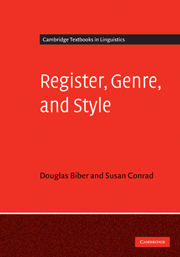Book contents
- Frontmatter
- Contents
- Acknowledgements
- 1 Registers, genres, and styles: fundamental varieties of language
- PART I Analytical framework
- Part II Detailed descriptions of registers, genres, and styles
- 4 Interpersonal spoken registers
- 5 Written registers, genres, and styles
- 6 Historical evolution of registers, genres, and styles
- 7 Registers and genres in electronic communication
- PART III Larger theoretical issues
- Appendix A Annotation of major register/genre studies (by Federica Barbieri)
- Appendix B Activity texts
- References
- Index
6 - Historical evolution of registers, genres, and styles
Published online by Cambridge University Press: 05 June 2012
- Frontmatter
- Contents
- Acknowledgements
- 1 Registers, genres, and styles: fundamental varieties of language
- PART I Analytical framework
- Part II Detailed descriptions of registers, genres, and styles
- 4 Interpersonal spoken registers
- 5 Written registers, genres, and styles
- 6 Historical evolution of registers, genres, and styles
- 7 Registers and genres in electronic communication
- PART III Larger theoretical issues
- Appendix A Annotation of major register/genre studies (by Federica Barbieri)
- Appendix B Activity texts
- References
- Index
Summary
Introduction
The preceding chapters have approached the analysis of registers from a synchronic perspective, considering the situational and linguistic characteristics of present-day varieties. These same techniques can be applied to registers from earlier historical periods. In many cases, these analyses show that a register has changed over time in some of its typical linguistic characteristics. Such changes reflect changes in the situational context of the register, like a shift in communicative purpose, a shift in the audience targeted by the register, or even changing attitudes about good style. In some cases, these changes can be so extreme that it is reasonable to ask whether the earlier variety actually represents the same register as the modern variety.
In the present chapter, we consider case studies illustrating these various kinds of change. We begin with a discussion of the fictional novel, showing how it has been recognizable as the same general register over the past four centuries. At the same time, there are some notable linguistic changes that distinguish typical novels in the eighteenth century from their modern-day equivalents.
Our second case study considers changes in scientific research articles. In contrast to the first case study, the linguistic and communicative changes documented in the second study are so extensive that they might be regarded as a shift to a new register – despite the fact that the study is based on research articles published in a single academic journal (The Philosophical Transactions of the Royal Society of London).
- Type
- Chapter
- Information
- Register, Genre, and Style , pp. 143 - 176Publisher: Cambridge University PressPrint publication year: 2009
- 1
- Cited by



